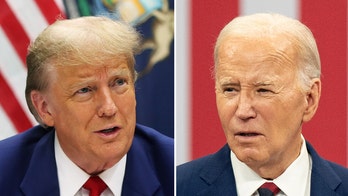President Obama on Wednesday called for a repeal of the nation's Clinton-era "Don't Ask, Don't Tell" policy banning openly gay citizens from serving in the military, calling it "the right thing to do," and while many Democrats appear to support the policy, it will be an uphill fight.
Republicans do not appear to be on board, and some conservative Democrats are also expected to bolt from the repeal.
Not surprisingly, Obama's 2008 presidential campaign opponent, Sen. John McCain, R-AZ, said Wednesday night, "I am immensely proud of, and thankful for, every American who wears the uniform of our country, especially at a time of war, and I believe it would be a mistake to repeal the policy.
McCain, a veteran, is the top Republican on the Armed Services Committee, so he is in a position to make some serious waves.
That committee's chairman, Carl Levin of Michigan, said earlier this week that he wants to see a repeal, but he cautioned moving too fast. "If we do this in a way which isn't sensitive...we could have exactly the opposite effect of what I hope will be the case -- which is to change the policy."
Levin told Fox tonight that the first hearing on this controversial policy could take place as early as February 2 (next Tuesday), a date already set for Defense Secretary Robert Gates and Joint Chiefs' Chairman Mike Mullen to testify about DOD's budget. But Levin said he plans on consulting McCain before announcing anything.
House GOP Leader John Boehner, R-OH, was even more emphatic with his 'no way'.
"When it comes to 'Don't Ask, Don't Tell,' frankly, I think it's worked very well. And we just ought to leave it alone," the leader told reporters, including our Bret Baier, Wednesday morning.
And Sen. John Cornyn, R-TX, a member of the Armed Services Committee and head of the Senate GOP campaign committee, echoed that sentiment, telling Fox, "At a time when we're putting our men and women through long deployments, it's really not a good idea to engage in social engineering in the military."
Cornyn was adamant, "I think it's not a good idea."
One thing is clear about the line in the speech, Obama sets no hard deadline (Washington is not good at them). He only sets a target of "this year," which could be disappointing to a key constituency which has not been too keen on the Obama agenda so far, despite some gains.
The wall of Republican opposition could well have gotten a bit stronger. In the Senate, the GOP, as a result of the Massachusetts Senate race, has enough numbers to mount a filibuster.
But he will have some help from the Human Rights Campaign (HRC), the nation's largest advocacy group for gay Americans, which announced Wednesday night a "Voices of Honor" campaign that it says "will organize veterans across the country, generate media coverage and build focused campaigns in key states that will be critical to the final votes in the House and Senate."
HRC President Joe Solmonese said, "Our country simply cannot afford this discriminatory law that hurts military readiness by denying patriotic men and women the opportunity to serve...Ridding our laws of discrimination that weakens our national security will require continued leadership from the President as well as Congressional allies."
HRC, in a release, touted legislation by Iraq War veteran Rep. Patrick Murphy, D-PA, that would abolish the ban and allow "open service by qualified lesbian and gay service members."




